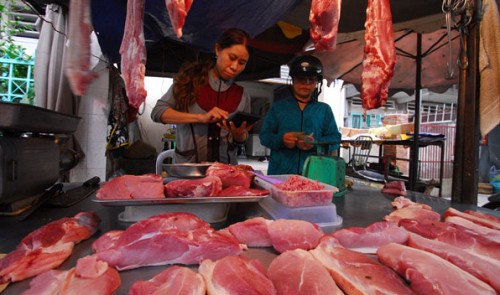A recent World Bank report claiming that up to 40 percent of pork in Hanoi and Ho Chi Minh City is potentially contaminated with the salmonella bacteria has raised concern and doubt as to whether the ratio is too high compared with Vietnam’s own statistics.
The World Bank data may not truly reflect the meat safety situation in those cities, according to local insiders.
The report, released on March 27, points out several alarming issues in Vietnam’s food safety risk management, such as the fact that 80 percent of pork is sold in wet markets, and 76 percent of meat is slaughtered in small and dirty facilities.
The World Bank also underlined that the most prevalent microbiological hazard in pork in Hanoi and Ho Chi Minh City is salmonella, with the bacteria found in 30 percent of the pork samples taken at slaughterhouses, and 40 percent of the pork found on sale at local markets.
Salmonella is a group of bacteria that cause typhoid fever, food poisoning, gastroenteritis, enteric fever and other illnesses, with people becoming infected mostly through contaminated water or foods, especially meat, poultry and eggs.
During the 2014-15 period, there were almost 370 outbreaks of food poisoning in Vietnam involving over 10,000 incidences resulting in the deaths of 66 people, with pathogen the biggest cause, accounting for 41 percent of the cases, according to the World Bank report.
Data difference
While the report has renewed concerns over Vietnam’s food safety, some industry insiders have taken the World Bank statistics with a pinch of salt, as the 30-40 percent infection rate is far higher than the 10-20 percent rate announced by the Vietnamese Animal Health Department.
The department claimed different sample taking processes will produce different results, as they rely on a number of factors, including how many and when the samples are collected.
Huynh Thi Kim Cuc, deputy head of Ho Chi Minh City’s food safety management board, told Thanh Nien newspaper she had yet to read the World Bank report.
The official said she could only comment on whether the World Bank data is accurate or not if she knows how, when and how many samples were taken.
Cuc said salmonella infection can easily take place during the slaughtering and transporting of meat, and given the humid weather of Ho Chi Minh City, “it is no surprise that the infection rate is so high as the World Bank may have taken the pork samples later in the afternoon.”
Assoc. Prof. and Doctor Nguyen Ngoc Tuan, a former lecturer at Nong Nam University, formerly the Ho Chi Minh City University of Agriculture and Forestry, also said the sample taking method greatly affects the result, so it is not incomprehensible that the Vietnamese animal health department and World Bank would have different data.
Van Duc Muoi, CEO of Vissan, Vietnam’s leading meat processor, showed his support for the World Bank report, particularly the assertion that pork safety is not ensured as the meat is mostly produced and sold at small, dirty slaughterhouses and wet markets.
“As for the salmonella infection ratio, an agency should conduct an independent study to give consumers the final answer,” he told Thanh Nien.





















































